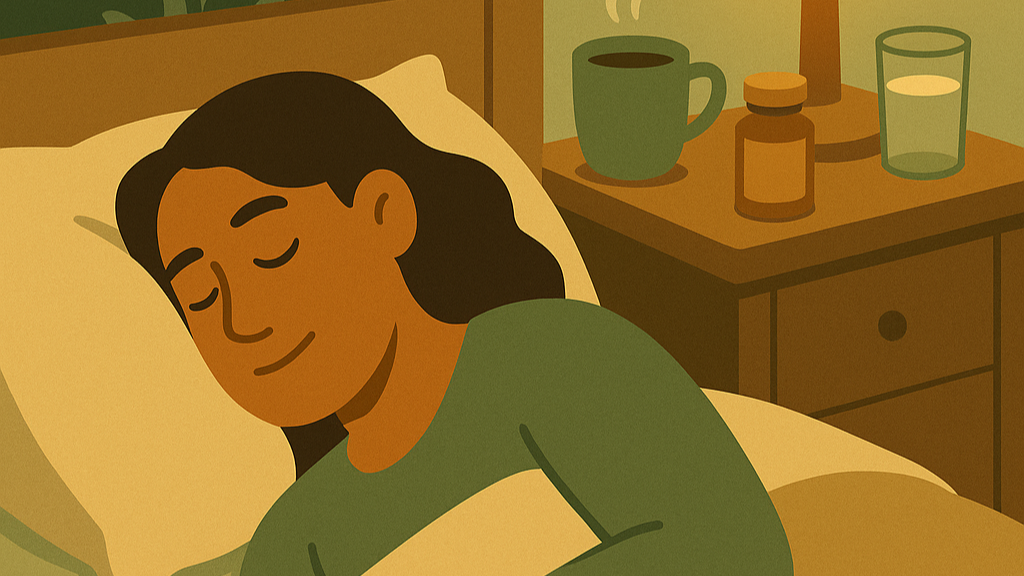
Sleep Smarter: Practical ways to improve rest
If you wake up groggy or find yourself counting sheep, you are not alone. This guide focuses on practical, low-stress ways to improve sleep quality through routine, environment, and gentle, natural supports. No miracles. Just helpful steps you can try this week.
Build a consistent sleep routine
Your body keeps time with an internal clock. Consistent bed and wake times help that clock run smoothly. The result is fewer nights staring at the ceiling and fewer mornings where you feel off.
What to try
- Pick a 60 minute window for bedtime and stick to it, including weekends when possible.
- Create a short wind down ritual that you can repeat. Reading, light stretching, journaling, breathwork, or a warm shower are simple options.
- Lower lights in the last hour before bed to signal that night has started.
- Do a five minute brain dump on paper if your thoughts are racing.
Why this helps
Your routine becomes a cue. After a few nights your body begins to expect rest at that time which makes falling asleep less of a struggle.
- Two minutes of slow breathing in for four, out for six.
- Three minutes of gentle neck and shoulder stretches.
- Five minutes of easy reading or journaling.
“Consistency builds habit. Habit builds rest.”
Make your bedroom sleep friendly
Small environment tweaks can make a noticeable difference in how quickly you fall asleep and how rested you feel in the morning.
Temperature
Many people sleep best in a cool room. Use breathable bedding and layer so you can adjust during the night.
Light
Block outside light with blackout curtains or a comfortable mask. Keep a small warm night light for bathroom trips.
Noise
Consistent sound works better than silence for many people. Try a fan, an air purifier, or a white noise app at low volume.
Screens
Phones and tablets can delay deep sleep. Plug your phone in outside the bedroom or use night mode and keep the screen facedown.
Comfort
If you wake with stiffness consider a pillow height that supports your preferred position. Side sleepers often benefit from a slightly taller pillow to keep the neck neutral.
Clutter free zone
Clear your nightstand and place only what you need. A tidy space reduces the mental noise that can keep you alert.
Evening habits that help, not hurt
What you do from late afternoon to bedtime influences how quickly you fall asleep and how refreshed you feel.
Caffeine
Caffeine can linger longer than most people think. Try making lunch your last caffeinated drink and switch to water or herbal tea later in the day.
Late meals
Heavy or spicy dinners close to bedtime can cause discomfort. If you are hungry late choose a small balanced snack instead of a full meal.
Alcohol
Alcohol may make you drowsy at first but it can lower sleep quality. If you drink leave time before bed and hydrate well.
Movement
Gentle stretching or an easy walk after dinner can help you feel settled. High intensity workouts are usually better earlier in the day.
Light exposure
Get bright natural light during the day when you can. Keep evenings dim. This daily contrast supports your natural rhythm.
Wind down boundary
Pick a time when work chats, email, and social feeds are closed. Protecting the last part of the evening helps your mind shift to rest.
Natural supports that people commonly use
These options are widely used to support relaxation and healthy sleep patterns. They are not cures. Responses vary person to person.
Melatonin
Often used for occasional sleeplessness, jet lag, or shift changes. Melatonin helps signal to your body that it is time for rest. Timing tends to matter more than taking more.
Magnesium glycinate
Commonly used to support relaxation and normal muscle and nerve function. Many people choose the glycinate form because it is typically gentle on the stomach.
Food sources include leafy greens, nuts, and seeds.
Herbal options
Chamomile tea is a classic evening choice. Some people also use ashwagandha in the earlier evening to support a calm response to everyday stress. If you take medication speak with a professional first.
Our approach at Loopwell Market: we stock factory sealed, third party tested products from trusted brands. Orders ship from Tampa, Florida. Availability, pricing, taxes, and shipping timelines are shown on each product page and at checkout before purchase.
A simple 7 day sleep reset you can follow
Use this friendly framework as a starting place. Adjust to your schedule. The goal is to build momentum with small wins.
| Day | Action | Why it helps |
|---|---|---|
| Day 1 | Set your sleep and wake targets. Charge your phone outside the bedroom if possible. Prepare a short wind down ritual. | Removes friction and creates a clear cue for rest. |
| Day 2 | Tidy the sleep space. Close blinds fully. Lay out pajamas, journal, or book so the routine is easy to start. | A tidy space reduces mental noise and decision making at night. |
| Day 3 | Get morning light within an hour of waking. Take a 10 minute evening walk. Dim lights one hour before bed. | Daily light contrast supports your natural rhythm and helps wind down. |
| Day 4 | Make lunch your last caffeine. Try herbal tea or water at night. Consider a magnesium rich snack like a few almonds. | Less stimulation late in the day makes it easier to settle. |
| Day 5 | Set a no scroll window for the last 30 minutes. Read or stretch instead. If using a phone as an alarm, switch to airplane mode and face it down. | Protects your attention and reduces late alerts that keep you wired. |
| Day 6 | Try a short wind down: slow breathing, light stretching, then five minutes of reading. | Creates a repeated pattern that your body learns to recognize. |
| Day 7 | Reflect and adjust. Keep the easy wins. Tweak one thing for next week. | Improvement comes from small changes repeated with consistency. |
Want a printable checklist for your fridge or nightstand? Contact us and we can provide a single page PDF.
Common sleep myths, corrected
Myth 1. Taking more melatonin guarantees better sleep
Reality: melatonin is a timing signal rather than a sedative. A higher dose does not automatically mean better rest. Many people do well with a conservative, label directed approach and consistent timing.
Myth 2. I can catch up on weekends
Reality: irregular schedules can leave you feeling off. A consistent sleep window tends to work better long term.
Myth 3. Screens help me unwind
Reality: bright screens can make it harder to drift off. If you use devices at night, switch to night mode and keep brightness low.
Myth 4. If I wake at night the night is ruined
Reality: brief waking is common. Keep lights dim, avoid clock watching, and use a calm cue like slow breathing or a short body scan.
When to talk to a professional
Lifestyle tips and natural supports can help, but they are not a replacement for medical care. Speak with a licensed healthcare provider if you experience any of the following:
- Ongoing insomnia that persists for weeks.
- Loud snoring or breathing pauses during sleep.
- Frequent nightmares or symptoms that disturb your partner.
- Restless legs or tingling that keeps you from falling asleep.
- Daytime sleepiness that affects safety or work.
If you are pregnant, nursing, have a medical condition, or take medication, seek professional guidance before using supplements.
Helpful tools, apps, and resources
Breathing and relaxation
- Box breathing: inhale four, hold four, exhale four, hold four for a few cycles.
- Progressive relaxation: gently tense and relax muscle groups from feet to head.
Apps
- Insight Timer for guided relaxation and timers.
- Calm or Headspace for wind down routines and sleep stories.
- Simple white noise apps if you prefer a steady background sound.
Books and light media
Choose gentle evening reading that helps you unplug. Save intense topics for daytime.
Daytime habits
- Short, regular activity supports how you feel at night.
- Seek natural daylight early when possible.
- If you nap, keep it short. Many people do best with 20 to 30 minutes.
How to shop sleep support responsibly
Check labels first
Review serving size, timing guidance, and cautions. More is not always better.
Quality signals
Choose factory sealed products from trusted brands that use third party testing.
Be consistent
Give a new routine or supplement time. Track how you feel for one to two weeks before deciding.
Be cautious with stacking
If you plan to combine multiple products start low and go slow. Ask a licensed professional if you are unsure.
Explore Sleep Support
Browse melatonin gummies, magnesium glycinate options, and calming herbal teas from trusted brands. Every item is factory sealed and ships from Tampa, Florida.
Prices, taxes, and shipping are shown before purchase. Availability may change.
Shipping, returns, and support
- Shipping options, costs, and delivery windows appear before you pay.
- Return eligibility and timelines are listed in our policies section.
- Questions before you buy? Our U.S. based support team is happy to help.
FAQ
What is the best natural supplement for sleep
There is no single best choice for everyone. Some people use melatonin for occasional sleeplessness or travel. Others use magnesium glycinate to support relaxation. Herbal teas like chamomile are also common. Read labels and check with a licensed professional if you have ongoing concerns.
How many hours of sleep do most adults need
Many adults feel their best with about seven to nine hours per night. Individual needs can vary.
Can I take melatonin every night
Melatonin is commonly used short term such as for travel or schedule changes. For long term use talk with a licensed healthcare provider for guidance that fits your situation.
When should I take magnesium glycinate
Many people take magnesium glycinate in the evening with a small snack following the label. If you take medication or have a health condition consult a professional first.
Do I need both melatonin and magnesium
Not necessarily. Some people prefer to try one change at a time so they can notice what helps most.
What if I work night shifts
Keep your sleep environment as dark and quiet as possible during your rest hours. Use blackout curtains and follow a consistent routine. For a personalized plan talk with a licensed professional.
Editorial Policy
- Clarity & compliance: plain-language guidance; no medical claims.
- Sources: reputable references and manufacturer labels; citations available upon request.
- Independence: product mentions reflect availability and relevance; promotions and stock may change.
- Updates: articles are reviewed periodically for accuracy and readability.
Questions or feedback? Contact admin@loopwellmarket.com.
Compliance notes and disclaimer
About our content: this article is educational. It is not medical advice and is not intended to diagnose, treat, cure, or prevent any disease. Supplements are not a substitute for professional care. Individual responses vary.
About our products and pricing: products are factory sealed and offered from trusted brands. Availability, pricing, taxes, and shipping costs are shown on product pages and at checkout before you buy. Promotions and stock can change. If something is unavailable, it will be indicated on the product page.
Contact: have questions? Contact our support team. We are happy to help you make informed choices.

